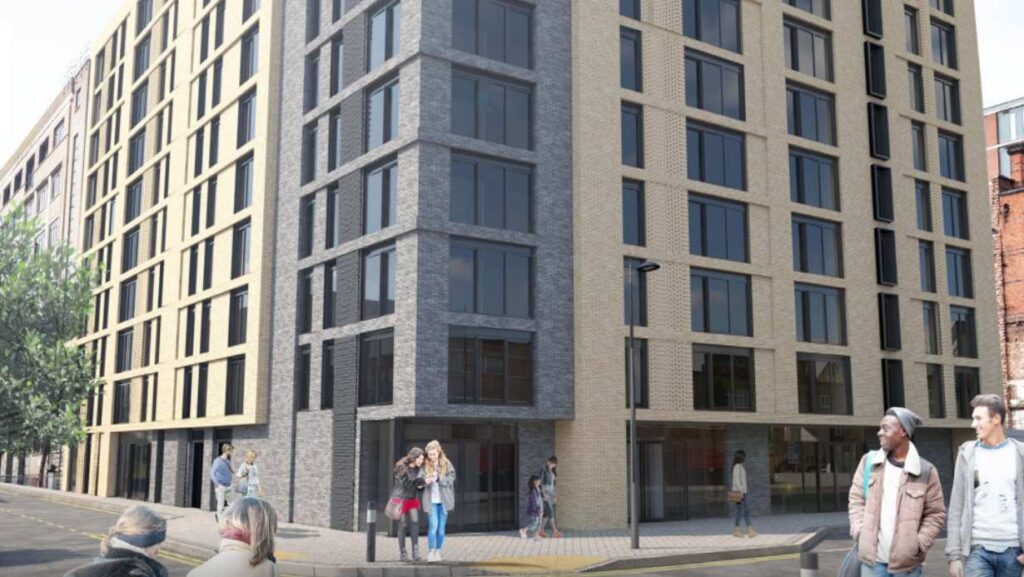Discover Birmingham, the thriving second city of the UK. With its vibrant atmosphere and high population density, this West Midlands hub has rapidly emerged as a premier location for property investment in the UK. If you’re searching for a top-notch buy-to-let investment opportunity, read on to learn why investing in Birmingham property could be the ideal choice for you.







Sapphire Court
Completion Date
Q3 2025
Prices From
£220,000
Buy-To-Let
Sapphire Court addresses the demand for housing in Birmingham, particularly among young professionals and local graduates. This Digbeth development includes 166 apartments, with 13 for affordable rent, spread across six to eight-storey buildings. Developed by the team behind Apex Lofts, it is part of the Southern Gateway and Rea Valley Urban Quarter, aiming to create a sustainable, mixed-use urban living environment.

Birmingham City Centre
Completion Date
Q4 2024
Prices From
£255,000
Buy-To-Let
This 30-storey luxury residential development by Regal Property Group, known for their successful high-rise projects in Birmingham City Centre, offers high-quality internal and external amenities, including an impressive roof garden and communal facilities. Located in the Southside area of Birmingham, the development boasts an excellent city centre location with primary access via Bristol Street and Suffolk Street Queensway.

City Greens
Completion Date
Q3 2024
Prices From
£182,000
Buy-To-Let
The site, featuring a supermarket and the Three Horseshoes Public House, is ideal for new high-density residential development. Its sustainable location, close to various facilities, will enhance the vitality of the area, aligning with national policy. This development also offers the chance to create a link between Coventry Road and the parkland to the west. Situated between Birmingham City Centre and Birmingham International along the A45 in Sheldon, the site overlooks the greenbelt strip Westley Brook and offers rare views of Sheldon Park.

Fountain Lofts
Completion Date
Completed
Prices From
£240,000
Buy-To-Let
All homes combine a cosy feel with a modern aesthetic, blending local red brick and New York-style accents into their ultra-modern interiors. Located in the heart of ‘The Creative Quarter,’ Fountain Lofts symbolizes Birmingham’s forward direction while honoring its history, providing comfortable, homely warmth. Each apartment features contemporary living and kitchen areas, bathed in generous natural light that highlights the high-quality finishes throughout.

Bank Tower
Completion Date
Completed
Prices From
£325,000
Buy-To-Let
Located in the heart of the city, The Bank offers luxurious one, two, and three-bedroom apartments in Birmingham’s tallest residential building. At over 100 metres high, this 33-storey skyscraper provides unparalleled views of one of Europe’s most vibrant cities and its unique canal network. With the Metro tramline at its doorstep, an on-site gym, shared open spaces, and easy access to the city’s amenities, life at The Bank is highly desirable.
Launch your property investment portfolio with a dependable and transparent company that help you hit your financial targets and nurture a long-standing partnership with you.
Why Invest in Birmingham?
Birmingham is the second-largest city in the UK, and it has become an increasingly popular destination for real estate investors looking to invest in property. There are many reasons why Birmingham is an excellent place to invest in property, including its strong economy, cultural vibrancy, and affordable property prices.
Birmingham has a strong and growing economy, with a focus on industries such as finance, professional services, and advanced manufacturing. The city has seen significant investment in recent years, with projects such as the HS2 high-speed rail link and the redevelopment of Birmingham New Street Station.
Additionally, the city is home to numerous universities, providing a steady stream of skilled workers to the local economy.
Our experience extends to assisting investors from all over the world.
The reviews left by our customers serve as a testament to our commitment to prioritising client satisfaction.
We offer only the very best property investment opportunities.
Birmingham is a culturally diverse city, with a thriving arts and culture scene. The city is home to numerous museums, galleries, theatres, and music venues, including the Symphony Hall, the Birmingham Repertory Theatre, and the Barber Institute of Fine Arts.
Birmingham has excellent transportation links, with an international airport and a major railway station that provides direct access to London and other major UK cities. Additionally, the city has an extensive public transportation system, including buses and a tram system.
Birmingham has a strong rental market, with high demand for rental properties. This demand, coupled with relatively affordable property prices, can lead to high rental yields for real estate investors. Additionally, the city’s growing economy and cultural vibrancy are attracting more renters to the city, providing a steady stream of tenants for investors.
Birmingham has undertaken significant regeneration projects in recent years, including the redevelopment of the Bullring shopping center, the Eastside development, and the Curzon Street Station. These projects have revitalized the city and provided new opportunities for real estate investors to acquire high-quality properties in desirable locations.
Birmingham property prices have been known to appreciate significantly over the long term. This appreciation can provide real estate investors with the potential for long-term capital gains, as well as a steady stream of rental income.

Property investment refers to the purchase of real estate with the intention of generating income and/or capital appreciation. Property investors can buy different types of properties, such as residential, commercial, industrial, or land, and can generate income through renting, leasing, or selling the property. Property investment is a long-term investment strategy that requires careful analysis of the property market, financial planning, and risk management. It can be a profitable investment if done correctly, but it also involves risks such as market fluctuations, tenant issues, and maintenance costs.
Investing in property can be a wise decision for several reasons. Firstly, property investment offers the potential for long-term capital appreciation, meaning the value of the property may increase over time. Secondly, property investment can generate income through rent or lease payments, providing a steady stream of cash flow. Additionally, property can provide a tangible asset that can be leveraged to secure loans or other forms of financing. Property investment is also considered a hedge against inflation, as rental income tends to increase with inflation. Finally, investing in property can provide diversification to an investment portfolio, spreading risk across multiple assets.
Getting started with property investment in the UK requires research, planning, and a solid financial foundation. The first step is to set investment goals and determine the type of property and location that align with those goals. Next, it’s essential to assess personal finances and obtain financing, whether through savings, mortgages, or loans. It’s important to conduct thorough research on the local property market and to seek professional advice, such as from real estate agents, mortgage brokers, and financial advisors. Once a suitable property is identified, it’s crucial to conduct a thorough inspection, including legal and structural assessments. Finally, it’s important to develop a plan for property management, including tenant selection, rent collection, and maintenance.
There are several types of property investments available in the UK. These include:
Residential properties – such as houses, flats, apartments, and HMOs (houses in multiple occupation).
Commercial properties – such as offices, retail spaces, industrial units, and warehouses.
Buy-to-let properties – which are residential properties purchased with the intention of renting them out to tenants.
Buy-to-sell properties – which are properties purchased with the intention of renovating and selling them for a profit.
Property funds – which are managed funds that invest in a portfolio of properties, providing diversification for investors.
Real estate investment trusts (REITs) – which are listed companies that invest in property and provide investors with regular income and potential capital gains.
Property development – which involves purchasing land or property and developing it to create new residential or commercial properties.
Each type of property investment carries its own risks and potential rewards, and it’s important to conduct thorough research and seek professional advice before investing.
Yes, it is possible to obtain a mortgage to invest in property in the UK. However, lenders may require a higher deposit and may charge higher interest rates than for a residential mortgage. Lenders will assess the potential rental income of the property and the borrower’s financial situation, including credit history and income, before approving a mortgage. It’s important to shop around and compare mortgage products from different lenders to find the most suitable option for the investment property. Additionally, seeking advice from a mortgage broker or financial advisor can help in navigating the mortgage application process and identifying the best options available.
Property investment carries several risks that investors should be aware of. Firstly, there is the risk of market fluctuations, where property values can decline due to factors such as changes in the economy, government policies, or interest rates. Secondly, property investors may experience periods of vacancy or non-payment of rent, which can impact their income and cash flow. Additionally, there are risks associated with property management, such as maintenance and repair costs, and dealing with tenant issues. There may also be legal and regulatory risks, such as changes to tax laws or zoning regulations, which can impact the profitability of the investment. Finally, there is the risk of overleveraging, where investors may take on too much debt to finance their investments, leading to financial difficulties and potential default. It’s essential to conduct thorough research and seek professional advice to manage these risks and make informed investment decisions.
There are several ways to minimize the risks of property investment:
Conduct thorough research: Before investing, it’s essential to research the local property market, the property itself, and the potential risks and rewards of the investment.
Seek professional advice: It’s important to seek advice from real estate agents, financial advisors, and legal professionals to make informed investment decisions and manage risks.
Diversify investments: Spreading investments across multiple properties or asset classes can reduce risk by minimizing exposure to any one investment.
Manage cash flow: Proper management of cash flow can reduce the risk of default or financial difficulties, ensuring that there is enough money to cover mortgage payments, maintenance costs, and other expenses.
Invest for the long-term: Property investment is a long-term strategy that can minimize the impact of short-term market fluctuations and provide steady income and capital appreciation over time.
Plan for contingencies: It’s important to have a contingency plan in place to manage unexpected events such as tenant issues, maintenance costs, or market fluctuations.
Regularly review and adjust investment strategy: Regularly reviewing and adjusting investment strategies can help minimize risks by ensuring that investments align with changing market conditions and personal financial goals.
Finding the right property to invest in involves careful research and analysis. Here are some steps to consider:
Determine investment goals: Before looking for a property, it’s important to define investment goals, such as the desired return on investment, location, property type, and investment timeframe.
Research the local property market: Conduct research on the local property market to identify areas with high demand, growth potential, and attractive rental yields.
Analyze property data: Analyze property data such as property prices, rental yields, and market trends to determine the potential return on investment.
Seek professional advice: Seek advice from real estate agents, mortgage brokers, and financial advisors to obtain expert insights and guidance on investment opportunities.
Inspect the property: Conduct a thorough inspection of the property, including legal, structural, and environmental assessments, to identify potential issues and risks.
Consider rental demand and potential: Evaluate the potential rental income of the property by considering factors such as location, size, and condition.
Calculate investment costs: Calculate the total investment costs, including the purchase price, financing costs, maintenance and repair costs, and taxes, to ensure that the investment aligns with investment goals.
Develop a management plan: Develop a management plan for the property, including tenant selection, rent collection, and maintenance, to ensure that the investment is managed effectively.
Managing a property investment portfolio involves several tasks, including property selection, acquisition, financing, maintenance, tenant management, and sale. Here are some steps to consider:
Develop an investment strategy: Define investment goals, risk tolerance, and target returns to guide portfolio management decisions.
Regularly review portfolio performance: Regularly review portfolio performance to ensure that investments align with investment strategy and market conditions.
Conduct due diligence: Conduct thorough research on potential investments to identify risks and opportunities.
Diversify investments: Spreading investments across different properties and asset classes can reduce risk and increase returns.
Manage cash flow: Manage cash flow effectively to ensure that there is enough money to cover mortgage payments, maintenance costs, and other expenses.
Develop a property management plan: Develop a property management plan to ensure that the properties are well-maintained, tenant issues are addressed promptly, and rent is collected on time.
Plan for contingencies: Develop a contingency plan to manage unexpected events such as tenant issues, maintenance costs, or market fluctuations.
Regularly review and adjust investment strategy: Regularly review and adjust investment strategies to ensure that investments align with changing market conditions and personal financial goals.
Consider tax implications: Consider tax implications of property investments and seek advice from tax professionals to minimize tax liabilities.
Property investment in the UK can have several tax implications that investors should be aware of. The main taxes that apply to property investments are:
- Stamp Duty Land Tax (SDLT): A tax on property purchases, which varies depending on the purchase price and whether the property is a second home or an investment property.
- Income Tax: Rental income is subject to income tax, and landlords must declare this income on their tax returns.
- Capital Gains Tax (CGT): A tax on the profits made from selling a property, which applies to the difference between the purchase price and the sale price, less any allowable expenses.
- Inheritance Tax (IHT): Property investments may be subject to IHT if the investor’s estate exceeds the IHT threshold.
- Value Added Tax (VAT): Commercial properties are subject to VAT, which can be reclaimed if the investor is VAT-registered.
It’s important to seek professional advice from tax professionals to understand the tax implications of property investments and to plan accordingly. Additionally, there are several tax planning strategies that investors can use to minimize tax liabilities, such as incorporating a property business or using tax-efficient investment structures.
There are several legal requirements that investors must comply with when investing in property in the UK. These include:
Compliance with planning and zoning regulations: Investors must ensure that the property complies with planning and zoning regulations, including obtaining any necessary planning permission and complying with building regulations.
Compliance with health and safety regulations: Property investments must comply with health and safety regulations, including providing adequate fire safety measures and complying with electrical and gas safety standards.
Compliance with landlord and tenant regulations: Investors must comply with landlord and tenant regulations, including providing tenancy agreements and protecting tenants’ deposits in a government-approved scheme.
Compliance with tax regulations: Property investors must comply with tax regulations, including paying the correct amount of Stamp Duty Land Tax, declaring rental income on tax returns, and paying Capital Gains Tax on any profits from property sales.
Compliance with anti-money laundering regulations: Investors must comply with anti-money laundering regulations, including conducting due diligence on buyers and sellers and reporting suspicious activity to authorities.
Failure to comply with legal requirements can result in fines, legal action, and damage to the investor’s reputation. It’s important to seek professional advice and ensure that all legal requirements are met before investing in property.
